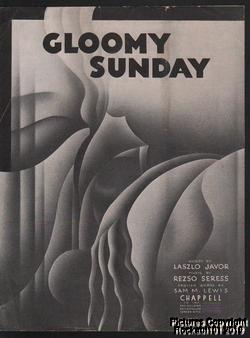 |
| 1936 Javor & Seress & Lewis Sheet Music - Gloomy Sunday / Suicide Song |

|
"Gloomy Sunday," words by Lazlo Javor and music by Rezso Seress with English words by Sam M Lewis. Eight pages front to back with a 1936 copyright. Published by Chappell & Co, New York. Approximately 9 in. X 12 in. Cover art shows an abstract illustration in black and grays. �Gloomy Sunday,� also known as the "Hungarian Suicide Song", is a popular song composed by Hungarian pianist and composer Rezső Seress and published in 1933.
The original lyrics were titled "V�ge a vil�gnak" (The world is ending) and were about despair caused by war, ending in a quiet prayer about people's sins. Poet L�szl� J�vor wrote his own lyrics to the song, titled Szomor� vas�rnap (Sad Sunday), in which the protagonist wants to commit suicide following his lover's death. The latter lyrics ended up becoming more popular while the former were essentially forgotten. The song was first recorded in Hungarian by pop singer P�l Kalm�r in 1935.
"Gloomy Sunday" was first recorded in English by Hal Kemp in 1936, with lyrics by Sam M. Lewis, and was recorded the same year by Paul Robeson, with lyrics by Desmond Carter. It became well known throughout much of the English-speaking world after the release of a version by jazz and swing music singer Billie Holiday in 1941. Lewis's lyrics referred to suicide, and the record label described it as the "Hungarian Suicide Song". There is a recurring urban legend which claims that many people have committed suicide while listening to this song, particularly Hungarians. �Gloomy Sunday,� words by Lazlo Javor and music by Rezso Seress with English words by Sam M Lewis. Eight pages front to back with a 1936 copyright. Published by Chappell & Co, New York. Approximately 9 in. X 12 in. Cover art shows an abstract illustration in black and grays. �Gloomy Sunday,� also known as the "Hungarian Suicide Song", is a popular song composed by Hungarian pianist and composer Rezső Seress and published in 1933.
The original lyrics were titled "V�ge a vil�gnak" (The world is ending) and were about despair caused by war, ending in a quiet prayer about people's sins. Poet L�szl� J�vor wrote his own lyrics to the song, titled Szomor� vas�rnap (Sad Sunday), in which the protagonist wants to commit suicide following his lover's death. The latter lyrics ended up becoming more popular while the former were essentially forgotten. The song was first recorded in Hungarian by pop singer P�l Kalm�r in 1935.
"Gloomy Sunday" was first recorded in English by Hal Kemp in 1936, with lyrics by Sam M. Lewis, and was recorded the same year by Paul Robeson, with lyrics by Desmond Carter. It became well known throughout much of the English-speaking world after the release of a version by jazz and swing music singer Billie Holiday in 1941. Lewis's lyrics referred to suicide, and the record label described it as the "Hungarian Suicide Song". There is a recurring urban legend which claims that many people have committed suicide while listening to this song, particularly Hungarians. Good condition (corner creases and a vertical crease at right center cover with light stain. Inside pages have a horizontal crease where folded and a small tear inside has been repaired with clear tape.)
Shipping & Handling
|  | US Shipping |
$3.99 USPS First-Class Mail®
|  | International Shipping |
Please check eBay's Shipping & Payment tab
USPS First-Class Mail International
|
|
|
|

